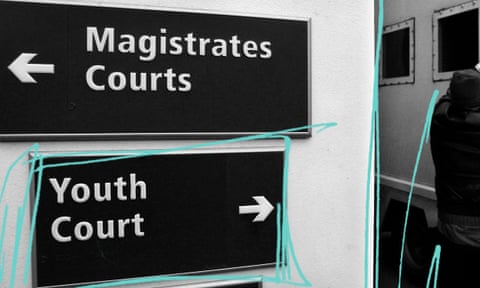The youth justice system in England and Wales is “chaotic and dysfunctional” following almost a decade of cuts and court closures, the children’s commissioner has warned, after a Guardian investigation found a system plagued by increasing delays, confusion and poor child protection.
Anne Longfield called for a wholesale review of the youth justice system, saying the youth court was “not a child-friendly environment where you could really help a young person and is not meeting standards that we had hoped”.
Q&AWhat is the Children in the dock project?
Show
Children in the dock is an investigation into the youth justice system in England and Wales, which in 2018 saw 26,881 children aged 10-17 cautioned or convicted of crimes ranging from shoplifting and joyriding to rape and robbery.
No other EU country puts such young children on trial. Most other nations do not use an adversarial system which can see children separated from their parents and lawyers via bulletproof glass in what is essentially an adult courtroom with a different sign on the door.
Officially, the focus in youth courts is on rehabilitation, tackling the underlying causes of youth offending. But although there has been an 88% drop in the number of children cautioned or convicted since 2007, reoffending rates have increased. Just over 40% of children who go to court reoffend within a year; for those sent to youth custody, that figure rises to 71.6%.
Children who end up in trouble now are disproportionately likely to be of black, Asian or minority ethnicity. They are vastly more likely to be in care and they are extremely likely to have ADHD, autism spectrum disorders and communication difficulties. This series examines how the court system deals with these vulnerable children and explores whether there is a better way to break the cycle of offending and help them build productive and fulfilling lives.
Through interviews, freedom of information requests and extensive research including a month covering every case in Greater Manchester’s youth court, one of England’s busiest children’s courtrooms, the Guardian has learned:
Cases involving children now take almost 40% longer than they did in 2010, with the slowest region, Sussex Central, taking 491 days on average to deal with a child from offence to conviction.
Reoffending rates for children are higher than they were ten years ago, with 40.9% of young people committing an offence within a year of being convicted or cautioned in 2017, compared with 28.3% of adults aged 21 or over.
Looked-after children are still being prosecuted regularly for damaging their care homes or assaulting staff, contrary to justice guidelines for police and prosecutors.
The proportion of children who received a youth caution or sentence who were black, Asian or minority ethnic has almost doubled since 2010, from 14% to 27% in 2018.
Children are being brought to court in handcuffs and locked behind bulletproof glass in a secure dock after committing minor offences or breaches, despite courts being told to put only the most dangerous children in the dock.
Some children appear in court without legal representation or an appropriate adult (a parent or social worker) to support them.
So many youth courts have closed that gang members end up in the same waiting rooms as rivals from other areas, with sometimes violent results.
Thousands of children are left in limbo for months or even years when released “under investigation”. In Greater Manchester in 2018-19, police failed to take decisions on 100 rapes and one murder with child suspects, leaving both them and their alleged victims in limbo.
The ministry of justice (MOJ) views the youth justice system as a success story after the number of children cautioned or convicted in England and Wales dropped from 106,969 in 2010 to 26,681 in 2018. This reduction has resulted in huge cost savings for a department with a budget that has been cut by a quarter since 2010, dropping from £9.82bn in 2010 to £7.36bn in 2018.
But experts warn that children who now come to court have grown up in the most dysfunctional and chaotic families, where drug and alcohol misuse, physical and emotional abuse and offending is common. They need far more intensive support and intervention to prevent reoffending, yet funding for youth offending teams in England and Wales has been cut from £333m in 2010 to £250m in 2018.
Greg Stewart, a criminal lawyer who served for nine years as the Law Society’s youth justice practitioner, said the government should reinvest the savings into early intervention work with the “really difficult” cases that still go to court.
“The residue that is left is the really difficult stuff, so you’ve got kids in gangs, kids who are in pupil referral units at the age of 12, kids who are excluded from education, kids who can barely read or write, kids with drug-addict parents – kids who need top intervention. And instead of recycling the savings they have made from the collapse in charging rates, what they have done, the MOJ, is said: ‘We’ll bank those savings.’”
Youth courts in England and Wales are housed in magistrates courts, half of which have been closed since 2010, meaning children have to travel up to 50 miles for their hearings. Stewart said there was gang “war” breaking out in Bromley magistrates court, which now deals with cases from all over south London after 15 out of 33 courts in the capital closed since 2010.

Longfield said her team had visited youth courts and were so shocked at what they saw that they planned a project looking at them in more detail next year.
“We have been going into youth courts too and seen firsthand what is largely chaos and dysfunction,” she said. “It was not an efficient or indeed child-friendly environment where you could really help a child. Not a productive environment. [It’s] chaotic, dysfunctional and not meeting standards that we had hoped.”
Charlie Taylor, the head of the Youth Justice Board in England and Wales, said he was concerned to hear that children were still being placed in a secure dock behind bulletproof glass when they were accused of relatively minor offences – often for just breaking their curfews. “Thats something that worries us: the number of children who appear in a secure dock who don’t need to be,” he said.
“We know that kids are being kept in the cells overnight for a minor breach or a tag or something and because they were brought up from the cells, the court staff automatically assume they should be in the dock.
“You look more guilty if you are behind a glass dock and there is evidence which shows juries [in the crown court] are more likely to convict people who sit behind a glass dock. But also in terms of access to justice, you don’t hear as well behind a glass dock.”
In 2016, Taylor carried out a review of the youth justice system for the government which stated: “Children should only be placed in the secure dock where they are at risk of absconding or committing acts of violence, and the fact that a child has been securely remanded should not mean that he or she is automatically placed in the secure dock.”
One knifepoint robbery trial witnessed by the Guardian saw two teenagers have to give their evidence through the gap in the bullet-proof glass rather than being allowed into the witness box, as per their legal right. The magistrates apologised to the boys after Amey, the private security firm that provides dock officers, said it was too short-staffed to let them out.
Reporting team: Helen Pidd, Josh Halliday, Maya Wolfe-Robinson, Nazia Parveen, Amy Walker, Nicole Wootton-Cane, Philip Marzouk










